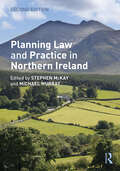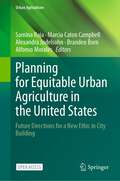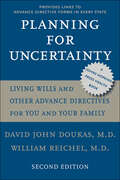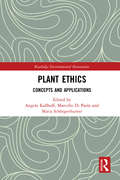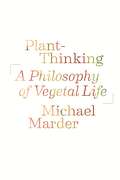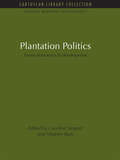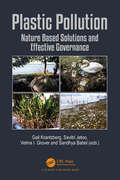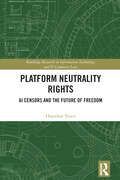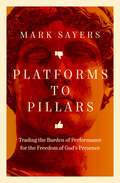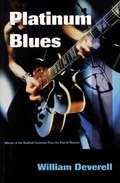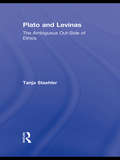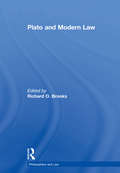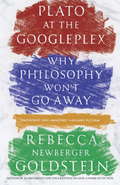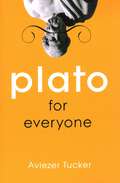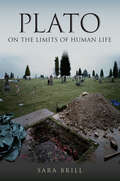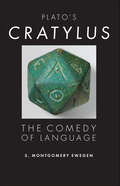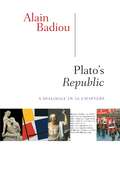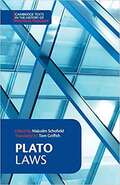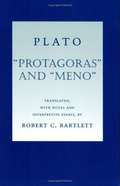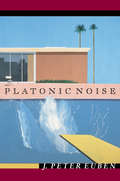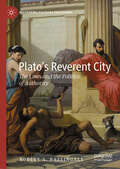- Table View
- List View
Planning Law and Practice in Northern Ireland
by Stephen McKay and Michael MurrayEach of the jurisdictions within the United Kingdom is constantly refining the operational characteristics of its planning system and while there are some common practices, there are also substantive divergences. In each territory the planning template is shaped within a dynamic political and legal context and thus students and practitioners require an accessible, in-depth and up-to-date literature dealing with this matter. The multi-disciplinary contributors to this expanded Second Edition of Planning Law and Practice in Northern Ireland explore the progression of planning within the region and discuss prominent facets of contemporary development management, development plans, environmental law, property law and professional practice. Consideration is given to the consequences of Brexit for planning in Northern Ireland, devolved government institutional structures for planning, and the post-2015 emergent performance of local authorities in this arena. The book makes an important contribution to the wider literature in this field and, with its extensive citing of statutes and cases, provides an essential resource for students, planning practitioners and researchers.
Planning for Equitable Urban Agriculture in the United States: Future Directions for a New Ethic in City Building (Urban Agriculture)
by Alfonso Morales Samina Raja Marcia Caton Campbell Alexandra Judelsohn Branden BornThis open access book, building on the legacy of food systems scholar and advocate, Jerome Kaufman, examines the potential and pitfalls of planning for urban agriculture (UA) in the United States, especially in how questions of ethics and equity are addressed. The book is organized into six sections. Written by a team of scholars and practitioners, the book covers a comprehensive array of topics ranging from theory to practice of planning for equitable urban agriculture. Section 1 makes the case for re-imagining agriculture as central to urban landscapes, and unpacks why, how, and when planning should support UA, and more broadly food systems. Section 2, written by early career and seasoned scholars, provides a theoretical foundation for the book. Section 3, written by teams of scholars and community partners, examines how civic agriculture is unfolding across urban landscapes, led largely by community organizations. Section 4, written by planning practitionersand scholars, documents local government planning tied to urban agriculture, focusing especially on how they address questions of equity. Section 5 explores UA as a locus of pedagogy of equity. Section 6 places the UA movement in the US within a global context, and concludes with ideas and challenges for the future. The book concludes with a call for planning as public nurturance – an approach that can be illustrated through urban agriculture. Planning as public nurturance is a value-explicit process that centers an ethics of care, especially protecting the interests of publics that are marginalized. It builds the capacity of marginalized groups to authentically co-design and participate in planning/policy processes. Such a planning approach requires that progress toward equitable outcomes is consistently evaluated through accountability measures. And, finally, such an approach requires attention to structural and institutional inequities. Addressing these four elements is more likelyto create a condition under which urban agriculture may be used as a lever in the planning and development of more just and equitable cities. This is an open access book.This is an open access book.
Planning for Uncertainty: Living Wills and Other Advance Directives for You and Your Family (A Johns Hopkins Press Health Book)
by William Reichel David John DoukasIt won’t happen to me.I’m too busy to worry about a living will.My family will know what to do.No one wants to plan for death or incapacitating illness. But, as the emotional legal battle in the Terri Schiavo case made all too clear, people of all ages need to document and communicate clear decisions about the final details of their lives while they are healthy and have time to fully consider their own values and preferences.Here, Drs. David Doukas and William Reichel help individuals make decisions and communicate their wishes to health care providers and family members and other loved ones.Drs. Doukas and Reichel use a question-and-answer format to guide readers through the process—emphasizing the crucial connection between values and treatment preferences. They explain advance directives and the health care decision-making process, including the values history, family covenants, proxies, and proxy negation. The appendix includes resources and Web links for learning about advance directive requirements and obtaining legal forms in all fifty states.This practical guide helps people navigate the important but often intimidating process of thinking about, and planning for, an uncertain future.
Plant Ethics: Concepts and Applications (Routledge Environmental Humanities)
by Angela Kallhoff, Marcello Di Paola and Maria SchörgenhumerLarge parts of our world are filled with plants, and human life depends on, interacts with, affects and is affected by plant life in various ways. Yet plants have not received nearly as much attention from philosophers and ethicists as they deserve. In environmental philosophy, plants are often swiftly subsumed under the categories of "all living things" and rarely considered thematically. There is a need for developing a more sophisticated theoretical understanding of plants and their practical role in human experience. Plant Ethics: Concepts and Applications aims at opening a philosophical discussion that may begin to fill that gap. The book investigates issues in plants ontology, ethics and the role of plants and their cultivation in various fields of application. It explores and develops important concepts to shape and frame plants-related philosophical questions accurately, including new ideas of how to address moral questions when confronted with plants in concrete scenarios. This edited volume brings together for the first time, and in an interdisciplinary spirit, contemporary approaches to plant ethics by international scholars of established reputation. It will be of great interest to students and scholars of Philosophy and Ethics.
Plant-Thinking: A Philosophy of Vegetal Life
by Michael MarderThe margins of philosophy are populated by non-human, non-animal living beings, including plants. While contemporary philosophers tend to refrain from raising ontological and ethical concerns with vegetal life, Michael Marder puts this life at the forefront of the current deconstruction of metaphysics. He identifies the existential features of plant behavior and the vegetal heritage of human thought so as to affirm the potential of vegetation to resist the logic of totalization and to exceed the narrow confines of instrumentality. Reconstructing the life of plants "after metaphysics," Marder focuses on their unique temporality, freedom, and material knowledge or wisdom. In his formulation, "plant-thinking" is the non-cognitive, non-ideational, and non-imagistic mode of thinking proper to plants, as much as the process of bringing human thought itself back to its roots and rendering it plantlike.
Plantation Politics: Forest plantations in development (Natural Resource Management Set)
by Stephen Bass Caroline SargentPlantations are playing an increasingly important part in the development and the economies of the South. Plantation Politics is the first book to examine their rationale and purpose, exposing the misconceptions and myths that have surrounded their role, and describing the contribution they can make to sustainable development. At their best, industrial plantations can become a major asset to local development by providing raw materials, infrastructure, employment, income and environmental and recreational services. At their worst, plantations, usually imposed from a 'top-down' perspective and ignoring local needs, values and rights, have monopolized land in times of food shortage, degraded wild animal and plant populations, and destroyed habitats and landscapes. The contributors analyse the conditions appropriate for both simple and complex plantations, and the contributions each can make. Complex plantations, whether established from scratch or within natural forest, are more suitable in most cases, where they are subject to numerous different claims and needs. However, their ownership, management and silviculture present new challenges � challenges which, without the carefully researched guidelines offered here, current policy and research may well be ill-equipped to take up. Caroline Sargent is the Director and Stephen Bass is the Associate Director of the Forestry Programme at the International Institute for Environment and Development. Originally published in 1992
Plastic Pollution: Nature Based Solutions and Effective Governance (Water)
by Velma I. Grover Gail Krantzberg Sandhya Babel Savitri JetooPlastics show up in every area of our lives. They are durable, cheap and light, properties that make them attractive but also problematic for the environment. The focus of this book is not just to highlight the problem of plastics, its definition, and how plastic pollution is impacting human health and environment but also to look at some best practices in both nature based solutions and in the field of law and policies. The first section of the book focuses on plastic pollution – it’s origin, relationship to climate change, linear/circular economy, followed by sustainable plastics, scientific solutions, and how policies can address plastic pollution. This includes looking at better designs, more sustainable feedstocks, and partnerships between various stakeholders worldwide including USA, China, Canada, South Korea, Thailand. This book will interest those who are associated with the production industry, packaging industry, and waste management industry as well as, academicians, students and policymakers.
Platform Neutrality Rights: AI Censors and the Future of Freedom (Routledge Research in Information Technology and E-Commerce Law)
by Hannibal TravisThis book analyzes questions of platform bias, algorithmic filtering and ranking of Internet speech, and declining perceptions of online freedom.Courts have intervened against unfair platforms in important cases, but they have deferred to private sector decisions in many others, particularly in the United States. The First Amendment, human rights law, competition law, Section 230 of the Communications Decency Act, and an array of state and foreign laws address bad faith conduct by Internet platforms or other commercial actors. Arguing that the problem of platform neutrality is similar to the net neutrality problem, the book discusses the assault on freedom of speech that emerges from public-private partnerships. The book draws parallels between U.S. constitutional and statutory doctrines relating to shared spaces and the teachings of international human rights bodies relating to the responsibilities of private actors. It also connects the dots between new rights to appeal account or post removals under the Digital Services Act of the European Union and a variety of fair treatment obligations of platforms under American and European competition laws, “public accommodations” laws, and public utilities laws. Analyzing artificial intelligence (AI) regulation from the point of view of social-media and video-platform users, the book explores overlaps between European and U.S. efforts to limit algorithmic censorship or “shadow-banning”.The book will be of interest to students and scholars in the field of cyberlaw, the law of emerging technologies and AI law.
Platforms to Pillars: Trading the Burden of Performance for the Freedom of God's Presence
by Mark SayersA biblical response to living in a platform society. Platform: A mentality, a way of approaching life, which promises to reinforce our uniqueness, deliver on our desires, and offer validation and visibility.A platform society emphasizes individualism and performance. It&’s rooted in the belief that self and personal desires are preeminent. In Platforms to Pillars, cultural expert Mark Sayers explores how platform mentality is misshaping our contemporary world and contrasts this to the biblical call of Christians to live as pillars.By looking at the ancient world—a world remarkably similar to our own—Sayers explores the flaws of a platform society. Sayers takes a deep dive into the influence and allure of digital platforms on individuals and society, and he invites readers to envision a legacy that lives beyond themselves. Like columns in buildings, human pillars provide support and strength. They work together to create space for others, partnering with God as He advances His kingdom in the world. Human pillars fortify and protect community through virtue and character and pass these values to others.Sayers shows us how to delight in God&’s presence, enjoying the freedom that flows from belonging to Him. A much-needed corrective, Platforms to Pillars models a biblical and better way for Christians to live.
Platinum Blues
by William DeverellIn this &“fast-paced, wickedly funny&” legal thriller, a small-town lawyer&’s case against a Los Angeles record label turns into a deadly media circus (Publishers Weekly). Living in the Northern California town of Foolsgold, widowed lawyer Oliver Gulliver is headed for a midlife crisis. It doesn&’t help that his eighteen-year-old daughter Elora has fallen in love with alcoholic former rock star C.C. Gilley. But then C.C. quits drinking and gets to work on a comeback album. Things actually seem to be looking up—until C.C.&’s car is stolen, with his priceless demo tape inside. In no time at all, another band is all over the radio with C.C.&’s song, and Oliver finds himself in Los Angeles working the biggest case of his life—suing a billion-dollar record company for plagiarism. But even as Oliver discovers his talent for charming the public, he finds out how nasty the music industry can get. When the stakes skyrocket from plagiarism to murder, Oliver will have to try C.C.&’s case like his life depends on it—because it does. &“Reeling off witty turns of phrase and uncanny plot twists, Deverell offers wonderfully sardonic takes on the worlds of music, law, Hollywood, Southern California and fatherhood--just for starters.&” —Publishers Weekly
Plato
by David Sedley Alex LongThe Clitophon, a dialogue generally ascribed to Plato, is significant for focusing on Socrates' role as an exhorter of other people to engage in philosophy. It was almost certainly intended to bear closely on Plato's Republic and is a fascinating specimen of the philosophical protreptic, an important genre very fashionable at the time. This is the first critical edition of this dialogue to be published in nearly seventy years. Professor Slings here provides a text based on new examination of all relevant manuscripts and accompanies it with a translation. His extensive introduction studies philosophical exhortation in the classical era, and tries to account for Plato's dialogues in general as a special type of exhortation. The Clitophon is seen as a defence of the Platonic dialogue. The commentary, the first ever to be published in English, elucidates the Greek and discusses many passages where the meaning is not entirely clear.
Plato and Levinas: The Ambiguous Out-Side of Ethics
by Tanja StaehlerIn the second half of the twentieth century, ethics has gained considerable prominence within philosophy. In contrast to other scholars, Levinas proposed that it be not one philosophical discipline among many, but the most fundamental and essential one. Before philosophy became divided into disciplines, Plato also treated the question of the Good as the most important philosophical question. Levinas's approach to ethics begins in the encounter with the other as the most basic experience of responsibility. He acknowledges the necessity to move beyond this initial, dyadic encounter, but has problems extending his approach to a larger dimension, such as community. To shed light on this dilemma, Tanja Staehler examines broader dimensions which are linked to the political realm, and the problems they pose for ethics. Staehler demonstrates that both Plato and Levinas come to identify three realms as ambiguous: the erotic, the artistic, and the political. In each case, there is a precarious position in relation to ethics. However, neither Plato nor Levinas explores ambiguity in itself. Staehler argues that these ambiguous dimensions can contribute to revealing the Other’s vulnerability without diminishing the fundamental role of unambiguous ethical responsibility.
Plato and Modern Law (Philosophers And Law Ser.)
by Richard O. BrooksThis audacious collection of modern writings on Plato and the Law argues that Plato's work offers insights for resolving modern jurisprudential problems. Plato's dialogues, in this modern interpretation, reveal that knowledge of the functions of law, based upon intelligible principles, can be reformulated for relevance to our age. Leading interpreters of Plato: Vlastos, Hall, Strauss, Weinrib, Annas, and Morrow, are included in the collection. The editor supplies an insightful introduction and extensive bibiography to the collection.
Plato at the Googleplex
by Rebecca GoldsteinIs philosophy obsolete? Are the ancient questions still relevant in the age of cosmology and neuroscience, not to mention crowd-sourcing and cable news? The acclaimed philosopher and novelist Rebecca Newberger Goldstein provides a dazzlingly original plunge into the drama of philosophy, revealing its hidden role in today's debates on religion, morality, politics, and science. At the origin of Western philosophy stands Plato, who got about as much wrong as one would expect from a thinker who lived 2,400 years ago. But Plato's role in shaping philosophy was pivotal. On her way to considering the place of philosophy in our ongoing intellectual life, Goldstein tells a new story of its origin, re-envisioning the extraordinary culture that produced the man who produced philosophy. But it is primarily the fate of philosophy that concerns her. Is the discipline no more than a way of biding our time until the scientists arrive on the scene? Have they already arrived? Does philosophy itself ever make progress? And if it does, why is so ancient a figure as Plato of any continuing relevance? Plato at the Googleplex is Goldstein's startling investigation of these conundra. She interweaves her narrative with Plato's own choice for bringing ideas to life--the dialogue. Imagine that Plato came to life in the twenty-first century and embarked on a multicity speaking tour. How would he handle the host of a cable news program who denies there can be morality without religion? How would he mediate a debate between a Freudian psychoanalyst and a tiger mom on how to raise the perfect child? How would he answer a neuroscientist who, about to scan Plato's brain, argues that science has definitively answered the questions of free will and moral agency? What would Plato make of Google, and of the idea that knowledge can be crowd-sourced rather than reasoned out by experts? With a philosopher's depth and a novelist's imagination and wit, Goldstein probes the deepest issues confronting us by allowing us to eavesdrop on Plato as he takes on the modern world.(With black-and-white photographs throughout.)
Plato for Everyone
by Aviezer TuckerPlato's dialogues, featuring his famous mentor Socrates, often prove difficult to understand for many contemporary readers. Students today miss the ancient cultural and historical references, and they have trouble following Plato's arguments as presented in dialogue format. This book remedies these problems by recasting five of Plato's dialogues into accessible and entertaining short stories in modern settings. The Euthyphro becomes a tale about a televangelist bent on disowning his son at a denominational boarding school in rural Virginia; the Crito - retitled "What do you have to do for your country?" - is focused on the question of whether a US citizen who considers a current war to be unjust should avoid a military draft by moving to Canada. In all of the stories (the Meno, the Statesman, and Phaedo are also included), the central character is Socrates, just as in the original dialogues, but here the maverick philosopher appears in twenty-first-century guise. The author, who has taught philosophy for many years, captures the tone, wit, and philosophical essence of Plato's dialogues in a modern English interpretation that is often amusing and fun to read. For instructors looking for an engaging way to interest undergraduates in Plato and for students who find the original works a bit daunting, this book offers an enlightening and enjoyable read.
Plato on the Limits of Human Life (Studies in Continental Thought)
by Sara Brill“A book that is an ambitious, well-researched and provocative scholarly reflection on soul in the Platonic corpus.” —PolisBy focusing on the immortal character of the soul in key Platonic dialogues, Sara Brill shows how Plato thought of the soul as remarkably flexible, complex, and indicative of the inner workings of political life and institutions. As she explores the character of the soul, Brill reveals the corrective function that law and myth serve. If the soul is limitless, she claims, then the city must serve a regulatory or prosthetic function and prop up good political institutions against the threat of the soul’s excess. Brill’s sensitivity to dramatic elements and discursive strategies in Plato’s dialogues illuminates the intimate connection between city and soul.“Sara Brill takes on at least two significant issues in Platonic scholarship: the nature of the soul, and especially the language of immortality in its description, and the relationship between politics and psychology. She treats each one of these topics in a fresh and nuanced way. Her writing is beautiful and fluid.” —Marina McCoy, Boston College
Plato's Cosmology and Its Ethical Dimensions
by Gabriela Roxana CaroneAlthough a great deal has been written on Plato's ethics, his cosmology has not received so much attention in recent times, and its importance for his ethical thought has remained underexplored. By offering accounts of Timaeus, Philebus, Politicus and Laws X, the book reveals a strongly symbiotic relation between the cosmic and human sphere. It is argued that in his late period Plato presents a picture of an organic universe, endowed with structure and intrinsic value, which both urges our respect and calls for our responsible intervention. Humans are thus seen as citizens of a university that can provide a context for their flourishing even in the absence of good political institutions. The book sheds new light on many intricate metaphysical issues in late Plato, and brings out the close connections between his cosmology and the development of his ethics.
Plato's Cratylus: The Comedy of Language (Studies in Continental Thought)
by S. Montgomery EwegenPlato's dialogue Cratylus focuses on being and human dependence on words, or the essential truths about the human condition. Arguing that comedy is an essential part of Plato's concept of language, S. Montgomery Ewegen asserts that understanding the comedic is key to an understanding of Plato's deeper philosophical intentions. Ewegen shows how Plato's view of language is bound to comedy through words and how, for Plato, philosophy has much in common with playfulness and the ridiculous. By tying words, language, and our often uneasy relationship with them to comedy, Ewegen frames a new reading of this notable Platonic dialogue.
Plato's Republic: A Dialogue in Sixteen Chapters (Gender And Culture)
by Alain BadiouPlato's Republic is one of the best-known and most widely-discussed texts in the history of philosophy. But how might we get to the heart of this work today, 2,500 years after its original composition? Alain Badiou breathes life into Plato's landmark text and revives its universality. Rather than producing yet another critical commentary, he has instead worked closely on the original Greek and, through spectacular changes, adapted it to our times. In this innovative reimagining of Plato's work, Badiou has removed all references specific to ancient Greek society—from lengthy exchanges about moral courage in archaic poetry to political considerations mainly of interest to the aristocratic elite—and has expanded the range of cultural references. Here, philosophy is firing on all cylinders: Socrates and his companions are joined by Beckett, Pessoa, Freud, and Hegel, among others. Together these thinkers demonstrate that true philosophy endures, ready to absorb new horizons without changing its essence.Moreover, Badiou—who is also a dramatist—has transformed the Socratic dialogue into a genuine oratorial contest. In his version of the Republic, the interlocutors do much more than simply agree with Socrates. They argue, stand up to him, put him on the spot, and show thought in motion. In this work of dramatic scholarship and philosophy, we encounter a modern version of Plato's text that is alive, stimulating, and directly relevant to our own world.
Plato: Laws (Cambridge Texts in the History of Political Thought)
by Tom Griffith Malcolm Schofield PlatóPlato's Laws is one of the most important surviving works of ancient Greek political thought. It offers sustained reflection on the enterprise of legislation, and on its role in the social and religious regulation of society in all its aspects. Many of its ideas were drawn upon by later political thinkers, from Aristotle and Cicero to Thomas More and Montesquieu. <p><p> This book presents the first translation of the complete text of the Laws for thirty-five years, in Tom Griffith's readable and reliable English. Malcolm Schofield, a leading scholar of Greek philosophy, introduces the main themes and characteristics of the work, as well as supplying authoritative notes on the structure and detail of Plato's argument, together with a guide to further reading. The book will be a key resource for those interested in Greek philosophy and of the history of political thought.
Plato: Protagoras and Meno
by Plato Robert C. BartlettThis volume contains new translations of two dialogues of Plato, the Protagoras and the Meno, together with explanatory notes and substantial interpretive essays. Robert C. Bartlett's translations are as literal as is compatible with sound English style and take into account important textual variations. Because the interpretive essays both sketch the general outlines of the dialogues and take up specific theoretical or philosophic difficulties, they will be of interest not only to those reading the dialogues for the first time but also to those already familiar with them. The Protagoras and the Meno are linked by the attention each pays to the idea of virtue: the latter dialogue focuses on the fundamental Socratic question, "What is virtue?"; the former on the specific virtue of courage, especially in its relation to wisdom. An appendix contains a short extract from Xenophon's Anabasis of Cyrus that vividly portrays the figure of Meno.
Platonic Noise
by J. Peter EubenPlatonic Noise brings classical and contemporary writings into conversation to enrich our experience of modern life and politics. Drawing on writers as diverse as Plato, Homer, Nietzsche, Borges, Don DeLillo, and Philip Roth, Peter Euben shows us the relevance of both popular literature and ancient Greek thought to current questions of loss, mourning, and democracy--all while arguing for the redeeming qualities of political and intellectual work and making an original case against presentism. Juxtaposing ancient and contemporary texts, politics, and culture, Euben reflects on a remarkable range of recent issues and controversies. He discusses Stoic cosmopolitanism and globalization, takes a critical look at Nietzsche's own efforts to make the Greeks speak to the issues of his day, examines a Greek tragedy through Hannah Arendt's eyes, compares the role of comedy in ancient Athens and contemporary America, analyzes political theory as a reaction to an acute sense of loss, and considers questions of agency and morality. Platonic Noise makes a case for reading political theory and politics through literature. Working as much through example as through explicit argument, Euben casts the literary memory of Athenian democracy as a crucial cultural resource and a presence in contemporary political and theoretical debates. In so doing, he reasserts the moral value of what we used to call participatory democracy and the practical value of seeing ourselves with the help of insights from long-gone Greeks.
Plato’s Charmides
by Thomas M. TuozzoThis book argues that Plato's Charmides presents a unitary but incomplete argument intended to lead its readers to substantive philosophical insights. Through careful, contextually sensitive analysis of Plato's arguments concerning the virtue of sophrosyne, Thomas M. Tuozzo brings the dialogue's lines of inquiry together, carrying Plato's argument forward to a substantive conclusion. This innovative reading of Charmides reverses misconceptions about the dialogue that stemmed from an impoverished conception of Socratic elenchus and unquestioned acceptance of ancient historiography's demonization of Critias. It views Socratic argument as a tool intended to move its addressee to substantive philosophical insights. It also argues, on the basis of recent historical research, a review of the fragments of Critias' oeuvre and Plato's use of Critias in other dialogues, that Plato had a nuanced, generally positive view of Critias. Throughout, readers are alerted to textual difficulties whose proper resolution is crucial to understanding Plato's often abstract arguments.
Plato’s Reverent City: The Laws and the Politics of Authority (Recovering Political Philosophy)
by Robert A. BallingallThis book offers an original interpretation of Plato’s Laws and a new account of its enduring importance. Ballingall argues that the republican regime conceived in the Laws is built on "reverence," an archaic virtue governing emotions of self-assessment—particularly awe and shame. Ballingall demonstrates how learning to feel these emotions in the right way, at the right time, and for the right things is the necessary basis for the rule of law conceived in the dialogue. The Laws remains surprisingly neglected in the scholarly literature, although this is changing. The cynical populisms haunting liberal democracies are focusing new attention on the “characterological” basis of constitutional government and Plato’s Laws remains an indispensable resource on this question, especially when we attend to the theme of reverence at its core.
Plausible Crime Stories: The Legal History of Sexual Offences in Mandate Palestine (Law in Context)
by Orna Alyagon DarrPlausible Crime Stories is not only the first in-depth study of the history of sex offences in Mandate Palestine but it also pioneers an approach to the historical study of criminal law and proof that focuses on plausibility. Doctrinal rules of evidence only partially explain which crime stories make sense while others fail to convince. Since plausibility is predicated on commonly held systems of belief, it not only provides a key to the meanings individual social players ascribe to the law but also yields insight into communal perceptions of the legal system, self-identity, the essence of normality and deviance and notions of gender, morality, nationality, ethnicity, age, religion and other cultural institutions. Using archival materials, including documents relating to 147 criminal court cases, this socio-legal study of plausibility opens a window onto a broad societal view of past beliefs, dispositions, mentalities, tensions, emotions, boundaries and hierarchies.
